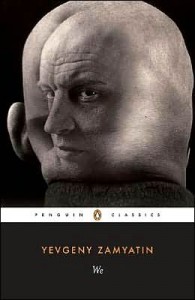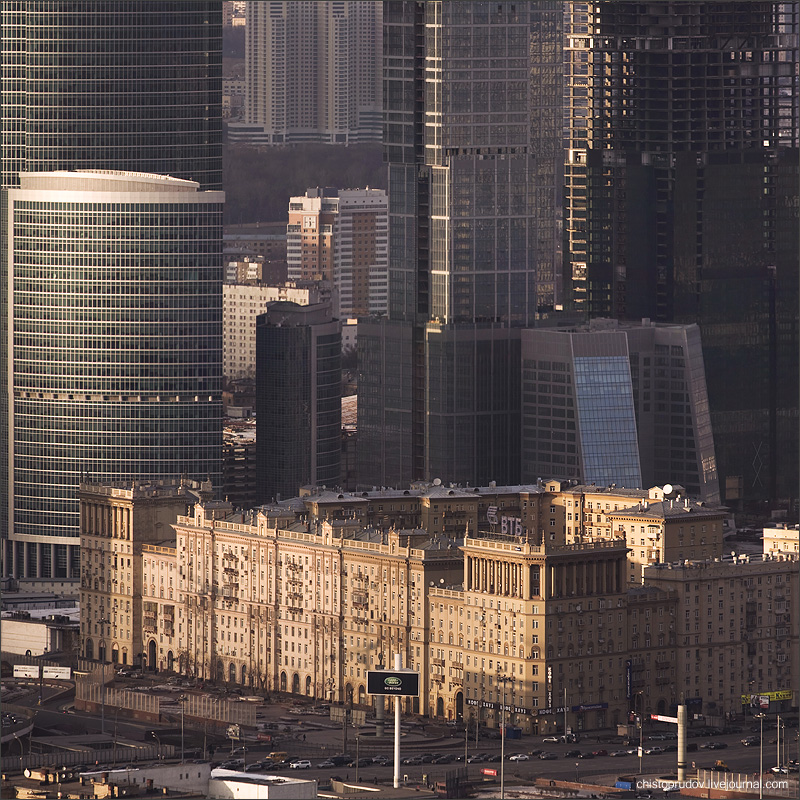Uncategorized
Reading Russia: We by Yevgeny Zamyatin
 We by Yevgeny Zamyatin is the dystopian novel you’ve never read. Or maybe you have read it. I don’t know. I had not heard of it until I found it on a recommended reading list of Russian novels, and then a former student of mine learned of my planned trip to Russia and loaned me his copy.
We by Yevgeny Zamyatin is the dystopian novel you’ve never read. Or maybe you have read it. I don’t know. I had not heard of it until I found it on a recommended reading list of Russian novels, and then a former student of mine learned of my planned trip to Russia and loaned me his copy.
What follows the jump is another post about my ongoing Russian lit reading experience. This post is in two parts: the first considers We‘s place in the world, which I thought I should share because the novel doesn’t seem all that popular or familiar to readers, though that was only my experience; the second part consists of a selection from the book and a quick revisit of Notes from the Underground.
I.
My edition begins with an introduction by translator Clarence Brown, who spends a great deal of time discussing the history of the novel, its themes and so on, and how it influenced later dystopian novels, particularly George Orwell’s 1984. Before I post my reaction to We, I’d like to take a moment to note some highlights from the introduction.
We was written from 1920 to 1921, and it was first published in English by Dutton in 1924 (translated by Gregory Zilboorg). Around the time before and during Zamyatin’s writing of We, WWI nearly destroyed Europe, Russia experienced revolution, civil war, famine, and the establishment of a socialist republic, and American efficiency expert Frederick Winslow Taylor “pioneered the time-and-motion studies that transformed industrial workers into maximally efficient adjuncts of the machines they were hired to operate.” Brown writes:
Zamyatin’s nightmare is a nightmare of the early twenties, and it is specifically the nightmare of a Russian who has spent time in the industrial north of England and read H.G. Wells, never forgetting his native Dostoevsky nor what he could see out the window.
Brown tells us that Zamyatin, who had spent two years building Russian icebreakers in England during the war, returned to St. Petersburg (Petrograd at the time) to live and write, and thus became We.
We‘s publication history is even more interesting. Brown explains how further translations came after Zilboorg’s translation, some of which hurt the integrity of the book in order to protect Zamyatin from prosecution. Of particular interest is the fact that We was not published in the Russian language until 1952 by Chekhov Publishing House of New York, nor did it appear in Russia until 1988 due to the Soviet cultural authorities’ censorship. Unfortunately, the dissemination of the novel did eventually created trouble for Zamyatin in the Soviet Union. Brown writes:
Fatigued and disheartened by the uninterrupted viciousness of the campaign against him, the ever-unconventional Zamyatin simply wrote the Benefactor, Iosif Stalin, saying that he’d done nothing to deserve death, and that for a writer to be denied every avenue of publication was the same thing as death. He therefore asked permission to go live abroad. Stalin, perhaps astonished or amused by such candor, and also no doubt on the advice of Gorky, granted the wish. Zamyatin quit his homeland forever in 1931.

II.
The basic story of We is this: the narrator, D-503, citizen of OneState, is an engineer charged with the task of working with the other engineers to build the INTEGRAL, OneState’s ambassadorial spacecraft that will integrate other alien worlds into the OneState society. As he works on the INTEGRAL, D-503 writes a series of records that he will place in the INTEGRAL for the distant lifeforms to read. His records become each chapter of the novel, and they trace his development: D-503 changes from a mere “number” in the OneState society to a disillusioned individual, someone sick, someone who has “an incurable soul.” As the book goes on, other characters appear, including the Benefactor, OneState’s leader, and I-330, a revolutionary.
We takes place in a new world, one divided by the 200 Years War into an enormous city, completely ruled by the laws of OneState, which have created a perfect, orderly world, and a wilderness beyond the green wall, which is characterized by change, disorder, and so on. This is the main tension in the book, the conflict of those two forces, and it’s something that struck me for how closely it connected to the struggles of Dostoevsky’s underground man, with whom I imagine Zamyatin was quite familiar.
In Notes from the Underground, the narrator often speaks of “twice two’s four” and warns of a “Crystal Palace” (and in We, all buildings are made of an indestructible, clear glass) and how to oppose these things. Here are a few selections and then a selection from We that I think connects well:
From Chapter 3:
God Almighty, what do I care about the laws of nature and about arithmetic when for some reason I don’t like these laws or ‘twice two is four’? Of course, I won’t knock this wall down with my head if in the end I haven’t got the strength to do so, but I won’t submit to it simply because I’m up against a stone wall and haven’t got sufficient strength.
From Chapter 9:
Suffering is indeed the sole cause of consciousness. Even if I declared at the beginning that in my opinion consciousness is man’s greatest misfortune, I know that man loves it and will not exchange it for any other form of satisfaction. Consciousness is, for instance, endlessly superior to twice two. After twice two, it goes without saying, there’s nothing left, not only nothing to do but nothing to discover either.
And here’s what Zamyatin’s D-503 says as he struggles against his newfound consciousness:
The multiplication table is wiser and more absolute than the ancient God. It never–repeat, never–makes a mistake. And there’s nothing happier than figures that live according to the elegant and eternal laws of the multiplication table. No wavering, no wandering. Truth is one, and the true path is one. And that truth is two times two and that true path is four. And wouldn’t it be absurd if these two happily, ideally multiplied twos started thinking about some kind of freedom, that is, about some mistake?
I like thinking about this connection between Dostoevsky and Zamyatin more than H.G. Wells and Zamyatin or Zamyatin and Orwell. The two books don’t seem all that different, I think, though I am pulling these passages out of context. They each seem to work at the same thing, but from a different place: Dostoevsky’s narrator from underground, D-503 from the high elevation of his clear, glass dwelling. One narrator speaks bitterly, the other perhaps innocently, but they each suffer from their inability to fully integrate into their respective societies. There is a feeling about the two books that reflects each author’s discomfort with the Russia of his time, and seeing this connection, seeing Zamyatin invoke Doestoevsky’s underground man makes me wish I had more than just a basic understanding of Russian history.
Maybe I’ll have to do that next, though I have already started reading Lermontov’s A Hero of Our Time.
Anyhow, thank you for reading.
Tags: Russia


Nice, Ryan. I appreciate these posts. They help to expand my reading scope and sphere of influence. It’s appreciated.
Nice, Ryan. I appreciate these posts. They help to expand my reading scope and sphere of influence. It’s appreciated.
“We” is so great. I read it in a Utopian Literature class as an undergraduate at Loyola New Orleans. That class was incredible, now that I’m thinking of it, but that book was by far my favorite.
“We” is so great. I read it in a Utopian Literature class as an undergraduate at Loyola New Orleans. That class was incredible, now that I’m thinking of it, but that book was by far my favorite.
Wow. I took two and a half years of russian lit classes, both past and present, taught by a Muscovite of 38 years and I’ve never heard of this. I’m getting this immediately. Very nice.
Wow. I took two and a half years of russian lit classes, both past and present, taught by a Muscovite of 38 years and I’ve never heard of this. I’m getting this immediately. Very nice.
Thank you for this. Now I have another book to add to the ever growing list of things I must read.
Thank you for this. Now I have another book to add to the ever growing list of things I must read.
david/nathan
we takes a afew hours to read. its very quick. i hope you enjjoy it.
david/nathan
we takes a afew hours to read. its very quick. i hope you enjjoy it.
Ryan, the sources of Zamyatin’s “We” include a number of his (modernist) contemporaries and teachers (in the broad sense of the word). The list of predecessors would include Leonid Andreev, Saltikov-Schedrin, Andrei Bely, Fedor Sologub, and, of course, Gogol. Zamyatin was one of the leaders of a very interesting group of writers who called themselves “Serapion Brothers” (name taken from an ETA Hoffmann story) who included a formalist scholar Shklovsky, a humorist Zoschenko, a novelist Veniamin Kaverin, and a number of others (all absolutely fascinating personalities). The writers of this group have all had very complicated publication histories in the US due to the fact that their writing was implicated in the Soviet politics. But the texts are a treasure trove (especially for a writerly reader); attention to form and richness of the subject matter.
Ryan, the sources of Zamyatin’s “We” include a number of his (modernist) contemporaries and teachers (in the broad sense of the word). The list of predecessors would include Leonid Andreev, Saltikov-Schedrin, Andrei Bely, Fedor Sologub, and, of course, Gogol. Zamyatin was one of the leaders of a very interesting group of writers who called themselves “Serapion Brothers” (name taken from an ETA Hoffmann story) who included a formalist scholar Shklovsky, a humorist Zoschenko, a novelist Veniamin Kaverin, and a number of others (all absolutely fascinating personalities). The writers of this group have all had very complicated publication histories in the US due to the fact that their writing was implicated in the Soviet politics. But the texts are a treasure trove (especially for a writerly reader); attention to form and richness of the subject matter.
ogla, your comment is so helpfu. thank you so much for this list of people to check out. im only slightly familiar with a couple names.
ogla, your comment is so helpfu. thank you so much for this list of people to check out. im only slightly familiar with a couple names.
‘We’ is great, read it during undergrad, and should probably go back to it. I also remember liking ‘Master and Margarita’… Now I want to read some Russian novels. Thanks.
‘We’ is great, read it during undergrad, and should probably go back to it. I also remember liking ‘Master and Margarita’… Now I want to read some Russian novels. Thanks.
Ryan — glad to help! Talking about Russian lit is a rarely exercised pleasure for me :)
Out of the list above, I really hope you check out Zoschenko before your trip. He’s very funny and is very well loved in Russia today — references to his work are bound to help you make lifelong friendships :))
Quickly googling him, I found a translation of one of his most famous stories here: http://www.emich.edu/studentorgs/bhouse/oldbhouse/zoschenko.html. The translation seems to be quite good, but it’s annoyingly broken up between several screens.
Ryan — glad to help! Talking about Russian lit is a rarely exercised pleasure for me :)
Out of the list above, I really hope you check out Zoschenko before your trip. He’s very funny and is very well loved in Russia today — references to his work are bound to help you make lifelong friendships :))
Quickly googling him, I found a translation of one of his most famous stories here: http://www.emich.edu/studentorgs/bhouse/oldbhouse/zoschenko.html. The translation seems to be quite good, but it’s annoyingly broken up between several screens.
thanks for this – im out of time a the moment but will add it to the pile this weekend (hopefully)
thanks for this – im out of time a the moment but will add it to the pile this weekend (hopefully)
[…] software? Who is more alive? Who is more vital? I ask the question because on the bus I am reading “We”, by Yevgeny Zamyatin, a dystopic novel about a scientific future where everyone is reasonable and every impulse and […]
[…] behalf, convincing Stalin to allow Zamyatin to leave Russia after the publication of We, which saved his life. Ronald Wilks, the translator of my edition of Gorky’s book My […]